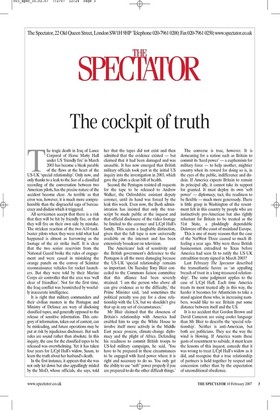The cockpit of truth
The tragic death in Iraq of Lance Corporal of Horse Matty Hull under US 'friendly fire' in March 2003 has become a bleak parable of the flaws at the heart of the US-UK 'special relationship'. Only now, and only thanks to a leak to the Sun of a classified recording of the conversation between two American pilots, has the precise nature of the accident become clear. As terrible as that error was, however, it is much more comprehensible than the disgraceful saga of bureaucracy and disdain which it triggered.
All servicemen accept that there is a risk that they will be hit by friendly fire, or that they will fire on their own side by mistake. The stricken reaction of the two A10 tankbuster pilots when they were told what had happened is almost as harrowing as the footage of the air strike itself. It is clear that the two senior reservists from the National Guard broke the rules of engagement and were casual in mistaking the orange panels on the convoy of Scimitar reconnaissance vehicles for rocket launchers. But they were told by their Marine Corps air controller that the area was 'well clear of friendlies'. Not for the first time, the Iraq conflict was besmirched by woefully inaccurate intelligence.
It is right that military commanders and their civilian masters in the Pentagon and Ministry of Defence are wary of disclosing classified tapes, and generally opposed to the release of sensitive information. This category of information, taken out of context, can be misleading, and future operations may be put at risk by injudicious disclosure. But such rules are sound rather than absolute. In this inquiry, the case for the classified tapes to be released was overwhelming. Yet it has taken four years for L/Cpl Hull's widow, Susan, to learn the truth about her husband's death.
In the first instance, it appears that she was not only let down but also appallingly misled by the MoD, whose officials, she says, told her that the tapes did not exist and then admitted that the evidence existed — but claimed that it had been damaged and was unusable. It has now emerged that British military officials took part in the initial US inquiry into the investigation in 2003, which gave the pilots a clean bill of health.
Second, the Pentagon resisted all requests for the tape to be released to Andrew Walker, the Oxfordshire assistant deputy coroner, until its hand was forced by the leak this week. Even now, the Bush administration has insisted that only the transcript be made public at the inquest and that official disclosure of the video footage be limited to the coroner and L/Cpl Hull's family. This seems a laughable distinction, given that the full tape is now universally available on the internet and has been extensively broadcast on television.
The Americans' lack of sensitivity and the British government's deference to the Pentagon is all the more damaging because the US-UK 'special relationship' remains so important. On Tuesday Tony Blair conceded to the Commons liaison committee that this alliance had been severely strained. 'I am the person who above all can give evidence as to the difficulty,' the Prime Minister said, 'and sometimes the political penalty you pay for a close relationship with the US, but we shouldn't give that up in any set of circumstances.'
Mr Blair claimed that the closeness of Britain's relationship with America had enabled him to urge the White House to involve itself more actively in the Middle East peace process, climate-change diplomacy and the plight of Africa. Defending his readiness to commit British troops to US-led military campaigns, he said, 'You have to be prepared in these circumstances to be engaged with hard power where it is right and necessary to do so. You only get the ability to use "soft" power properly if you are prepared to do the other difficult things.'
The converse is true, however. It is demeaning for a nation such as Britain to commit its 'hard power' — a euphemism for military force — to help another, mightier country when its reward for doing so is, in the eyes of the public, indifference and disdain. If America expects Britain to remain its principal ally, it cannot take its support for granted. It must deploy its own 'soft power' — diplomacy, tact, the readiness to be flexible — much more generously. There is little grasp in Washington of the resentment felt in this country by people who are instinctively pro-American but also rightly reluctant for Britain to be treated as the 51st State, a ploddingly dependable Delaware off the coast of mainland Europe.
This is one of many reasons that the case of the NatWest Three caused so much illfeeling a year ago. Why were three British businessmen extradited to Texas before America had seen fit to ratify the US-UK extradition treaty signed in March 2003?
Last February The Spectator described the transatlantic furore as 'an appalling breach of trust in a long-treasured relationship'. The same judgment applies to the case of L/Cpl Hull. Each time America treats its most trusted ally in this way, the harder it becomes for Atlanticists to take a stand against those who, in increasing numbers, would like to see Britain put some distance between itself and the US.
It is no accident that Gordon Brown and David Cameron are using cooler language than Mr Blair to describe the 'special relationship'. Neither is anti-American, but both are politicians. They see the way the wind is blowing. If America wants these gusts of resentment to subside, it must learn the lessons of this inquest, concede that it was wrong to treat L/Cpl Hull's widow as it did, and recognise that a true relationship of partners is held together by respect and concession rather than by the expectation of unconditional obedience.













































 Previous page
Previous page